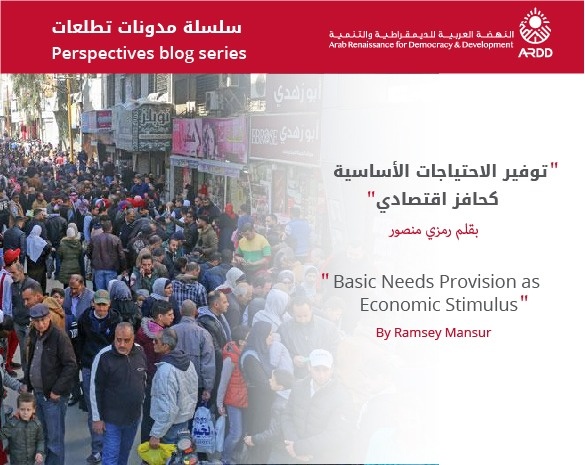By Ramsey Mansur
The solutions for addressing the economic effects of the COVID-19 pandemic cannot be limited to the supply side in light of widespread loss of income and cautious demand. To stimulate demand in a country coming out of a seventy-day partial to complete lockdown with significant portions of the population reliant upon informal daily wages, cash assistance and basic needs assistance must be made available to ensure their survival. However, basic needs provision must extend beyond those that are most vulnerable, beyond those now, and previously, living in abject poverty. Rather, they should be provided to a large swathe of Jordanian society, not only through a selective process for a limited segment of the population. The question however begs itself; how can this extension contribute to economic stimulus?
In light of the crisis, and the ensuing cautious demand, there is the possibility of directly affecting the ability of these groups to purchase, even if their willingness cannot be directly affected. The provision of basic needs allows for the re-allocation of income, or funds, to the purchase of other goods and services or current purchases at higher levels; either would lead to an increase of consumption. Consequently, the provision of basic needs would have the same effect as an increase in income. The direct targeting of the ability of people to consume through the provision of basic needs, could also affect their willingness to consume; as low income populations tend to have a high marginal propensity to consume (MPC), especially in relation to high income populations. This entails that a high proportion of each added Dinar in income received will be consumed, therefore this type of initiative would constitute both a social safety net as well as an effective method of injecting money into the economy.
Women specific needs must also be considered under the definition of basic needs in such initiatives. The provision of women specific basic goods, such as women hygiene products, becomes paramount in times of crises, as in patriarchal societies under economic stress these are the needs most likely to be the first sacrificed. The lack of purchase of these goods does entail economic consequences as their purchase is in fact consumption. Furthermore, we do have private sector actors that are already established in the production of such goods, and this would potentially mitigate the loss of revenues or increase them as these products become more readily available to all. This would not necessarily affect the importers of these products, as the cost in time and other factors of reaching and waiting at distribution centers of those that can afford to have preferences would outweigh the financial cost of their purchase. Furthermore, in implementation, decision makers must include women voices in such an initiative, and these voices must not be isolated to women in government or in upper and middle classes which are easier to access, but must include those from the targeted populations. However, effectiveness must be balanced by efficiency in times of crisis, and consequently civil society should be the tool used to convey these voices.
From the supplier side there are also obvious benefits in the provision of basic needs. The government purchase of basic needs from local private sector actors would provide suppliers with certain demand in a time of uncertainty. Furthermore, even for small retail outlets, there are benefits, as if the ‘added income’ is no longer spent on basic goods, which in many cases have low margins of profit and have price ceilings set by the government or market, but rather spent on other goods that might provide higher profit margins.
However, the procurement mechanism must be effective and transparent for the benefit of both the beneficiaries and the government itself, and though it might open new corridors for corruption, in times of crisis, interventions with inefficiencies are better than no interventions at all. Of course, questions of feasibility on behalf of government arise, but currently the government borrows for much less effective interventions or no interventions at all, with little in regards to benefits for lower income communities. Current expenditures have not shown their value in recent years in terms of development, economic growth and in facing the crises that have affected the country. So perhaps it is time for the government to re-allocate some of what it borrows for these purposes.


